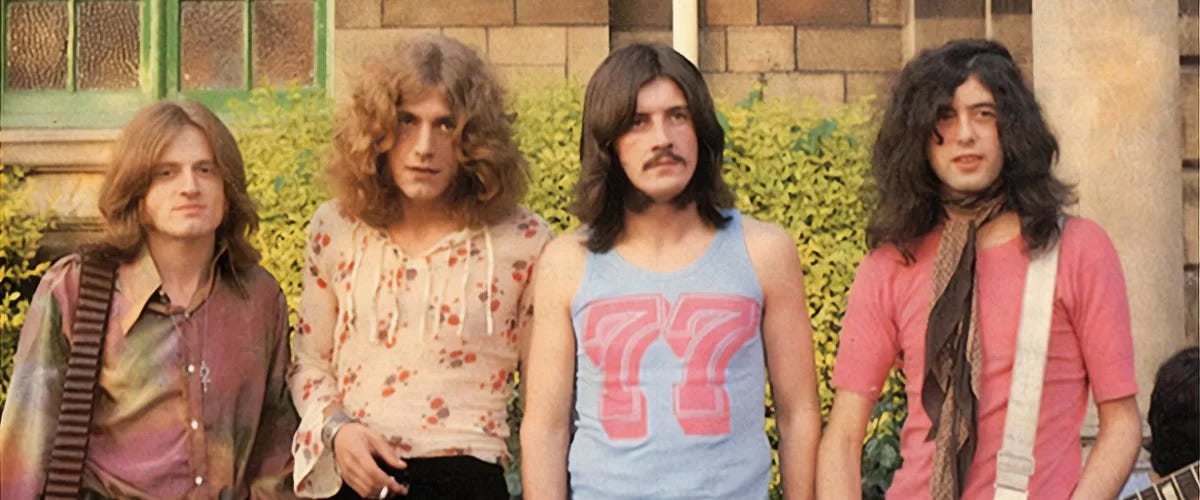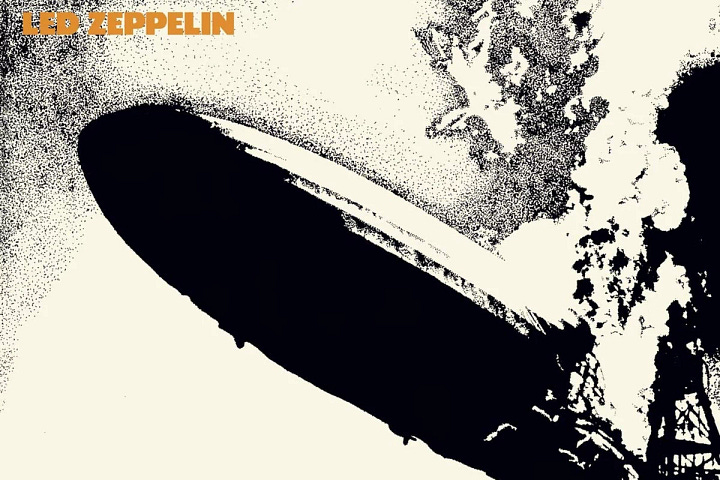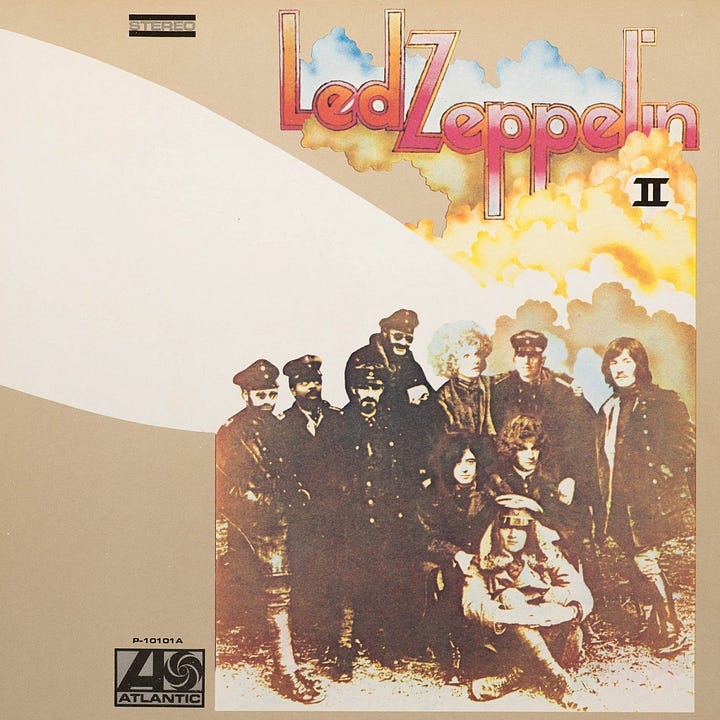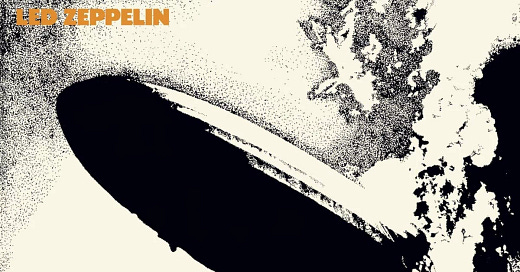Movie Review: ‘Becoming Led Zeppelin'
Showing At Buffalo’s North Park Theater Until February 20
My love for music was in its formative stages when Led Zeppelin came upon the scene. In the upper middle class, midwestern suburbs of my early adolescence, Led Zeppelin loomed large.
Their music was a unifying element among the school cliques populated by jocks, theater kids, and burnouts. Everyone listened to Zeppelin and every third desk in my Algebra class bore a carved “ZEPPELIN RULES” proclamation, outlined in blue ball point.
Every high school rock band (including my own) made a run at playing a Zeppelin cover or two, but were generally defeated by level of difficulty. While I could, with practice, play some of Jimmy Page’s classic riffs, few drummers could replicate John Bonham’s huge sound.
Even if three of us somehow put together a passable instrumental facsimile, there was nobody around who could sing like Robert Plant. We therefore left Zeppelin covers to the professional Led Zeppelin tribute bands that — to this day — get regular work in cities across the world.
The outsized role that Led Zeppelin played in my early life is perfectly embodied by “Otto,” the rock music worshipping, stoner school bus driver in “The Simpsons.”
In the show’s “Lord of the Flies” homage “Das Bus,” (Season 9, Episode 14) a grapefruit racing contest spins out of control, sending the bus careening into the Springfield River. Otto bravely takes the initiative, telling the frightened students, “just hang tight kids! I’ll swim for help!”
Alas, the current proves too powerful. As Otto is swept to his watery grave, he valiantly summons his final breath and calls out “ZEPPELIN RULES!” before succumbing to the depths.
That is pretty much what Led Zeppelin meant to me.
Those tribute bands generally model their performances after the 1976 concert film, “The Song Remains The Same” (above), memorializing the band’s legendary 1973 Madison Square Garden performance.
It was a regular “midnight movie” feature where I grew up, an experience tragically compromised by paranoid mall security personnel who were always totally hassling me even though I didn’t even do anything and I was just sitting there.
It took another 50 years for “Becoming Led Zeppelin,” which I saw at the North Park Theater at its opening this afternoon (February 14, 2025). This is a movie you want to see in the theater, as North Park’s sound system cannot be duplicated at home.
“Becoming Led Zeppelin” was written by Bernard MacMahon and Allison McGourty and directed by MacMahon, the same team who created 2015’s “American Epic” documentary series that chronicled early field recordings of American rural music in the 1920s.

“Becoming Led Zeppelin” is an authorized documentary, created with the blessing and participation of the members (John Bonham appeared in audio recordings). It was flattering, to be sure, but never quite crossed the border into hagiography.
Each musician was interviewed in his home, recounting his childhood in a broken but unbowed postwar Britain. They discussed their early musical inspirations: for Jimmy Page, Lonnie Donegan’s “Jack of Diamonds” was a revelation, and John Bonham loved Gene Krupa.
John Paul Jones played church organ to earn enough money to buy a Fender bass, and Robert Plant’s love of Sonny Boy Williamson meant “America was my dream.” While it may be tempting to compare Led Zeppelin’s origin story to that other English musical quartet from Liverpool, the two are distinct.
By the time the band played together for the first time in 1968, Page and Jones were high-level studio musicians (that’s them on guitar and bass on “Goldfinger” and “To Sir With Love”). Meanwhile, Robert Plant and John Bonham had conquered the West Midlands music scene and were ready for more.


After one London rehearsal they knew they had something special and played a short tour of Scandinavia before recording their first album, whose bombastic, improvisational style was initially unloved in the UK.
Critics savaged their debut recording; Rolling Stone called the songs “weak and unimaginative,” sung by a “prissy” Robert Plant (music critics - amiright?). No matter. The band gained momentum after a long, grinding tour of North America.
This first half of the movie is chatty, but when the music comes it comes fast and loud. We see live performances of “Communication Breakdown,” “Dazed and Confused,” and “I Can’t Quit You Baby,” and more, accompanied by debauchery-free tales of life on the road.
The passage of time is indicated by visual montages of news footage and Jimmy Page demonstrates the studio wizardry behind “Whole Lotta Love.” Robert Plant explains his Tolkien inspiration for “Ramble On,” and his bandmates rhapsodize about Bonham’s virtuosity on “Moby Dick.”
The movie ends with their triumphant January 9, 1970 homecoming performance at the Royal Albert Hall.
Because Led Zeppelin essentially emerged fully-formed led by a veteran music industry professional (Page), they were able to avoid music industry exploitation. They created and owned their albums and flatly refused to release singles.
Their deal with Atlantic Records included complete creative control and their first two albums were released into an emergent FM radio network. Many stations played them uninterrupted, essentially creating the “album rock” format and forever changing popular music.
That’s where I, Otto from the Simpsons, and millions of others come in.
As I watched “Becoming Led Zeppelin,” I felt the same chills in my spine I felt half a century ago.
I think I can still play “Black Dog.” I just need to find my amp.
“Becoming Led Zeppelin” was produced by Big Beach and Paradise Pictures and distributed by SONY Pictures Classics. It was released to theaters in North America on February 7, 2025. It has a running time of 121 minutes and is rated PG-13.
This review is based on a February 14, 2025 viewing at Buffalo’s North Park Theater where it runs through February 20, 2025. Tickets and more information can be found here.



